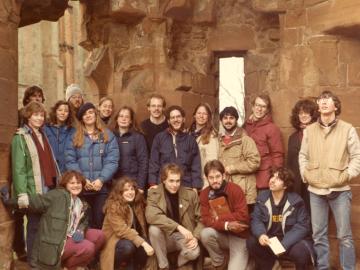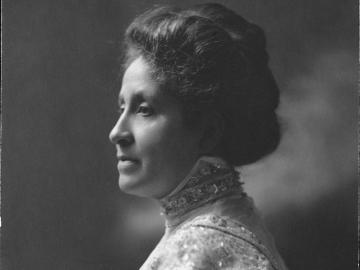Oberlin Alumni Magazine
Feels on Wheels
June 21, 2023
G.M. Donley ’83

When he first arrived at Oberlin, Josh Bisker ’05 brought a terrible bicycle from home. Lucky for him, it was stolen.
“I’m embarrassed to admit it, but it was a huge relief,” he recalls. “I hated riding that thing.”
In his fourth year, Bisker inherited a broken-down family bike that had been sitting in a garage in Baltimore since the early 1970s. He’d been reluctant to visit the Oberlin College Bicycle Co-op, located in the basement of Keep Cottage since its founding in 1986. He found himself intimidated by the anarchic, punkish vibe of the place.
But he really needed that bike. “I was living off campus, and this was going to be a lifeline.”

foster a place for the entire community to repair bikes.
So Bisker worked up his nerve and began to volunteer at the co-op, keeping a very low profile but paying attention and learning a lot. “I really liked that it was volunteer-run and organized, that it had links to the town, and that so much of its energy went to supporting kids building floats for the Big Parade. I especially loved the ‘freedom-to-fail’ atmosphere.”
He found that very important in a hands-on educational space. “It was really easy to start contributing because you would learn one thing, and then you’d be able to help other people to learn that one thing,” he says. “You were able to be an equal contributor to the cohesive whole really quickly.”
Today, Bisker is the founder and executive director of Mechanical Gardens Bike Co-op, “a come-one, come-all educational center for bike repair and maintenance” located in Brooklyn, New York. In 2015, he called together a group of community organizers to help launch the place, leveraging the knowledge he’d gained at Oberlin and from other bike co-ops to inaugurate a new resource for New York City.
Eight years later, Mechanical Gardens has had two different headquarters and organizes pop-up repair events across the five boroughs. They’ve served more than 10,000 visitors, provided more than half a million dollars in parts and services, run approximately 1,000 events, and logged nearly 50,000 hours of volunteer labor.
During the height of the pandemic, the co-op launched New York City’s first and only outdoor center for bike-repair education, staging a giant build-a-thon for healthcare workers and moving its base of operations to Red Hook, a transit-isolated waterfront neighborhood. The organization, Bisker says, “has played a unique role in increasing equitable access to bicycling, along with its social and economic benefits for individuals and communities.”
That’s the whole thrust of an Oberlin education: How can we structure our relationships to power so that we can make the world more just?”
Happiness is a grimy multitool
Mechanical Gardens’ model is built around drop-in hours during which anyone can work on their bicycle. “We do not fix your bike for you,” Bisker says. “We put the tools in your hands—the tools for happiness, I like to say—and teach you how to fix your bike. It’s not only about making sure people have bikes to ride, but also about instilling a feeling of empowerment and actual structured pathways for anyone to take control of their own mobility. It’s a volunteer-run and volunteer-held space, run in community and by community.” Pricing is suggested, so there are no financial barriers. The no-cost citywide mobile pop-up events, which are supported by the New York City Department of Transportation, are more about direct service provision than education—just volunteers helping make sure everybody’s bikes are working well.
Bisker’s experience has involved more than setting up a fun place to hang out with other cyclists. “I’ve gotten a degree in urban planning, and that has helped me mix my interests in urban equity with an understanding of spatial justice: the way that our physical spaces matter to our sociology and our frontiers for liberation inside our cities, in our embattled democracy, and in our centers for community action.”
His access-oriented philosophy can be seen in the co-op’s commitment to using design to promote social equity. After all, bike co-ops can have ambitious education programs and offer free service, but “often the spaces themselves are still oriented around people with more privileged access to knowledge—people who have already benefited from that freedom to play and fail,” says Bisker. He cites the countless specialized nuts and bolts, which are often organized according to esoteric characteristics that only an experienced bike mechanic would understand. Or the way something as seemingly innocuous as a tool board layout can create a barrier to use.
“We’re trying to physically as well as programmatically embody the equity ideals that we’re striving to foster,” Bisker says. “The physical spaces need to be designed around the needs of the people who need access to them. These are design challenges that are overlooked inside of most educational programs, where people can end up inadvertently reinscribing the same systems of privilege that they’re trying to overcome.”
To Bisker, this disconnect between mission objectives and design of the spaces where those missions are carried out is one of the very common—but very solvable—problems of organizations seeking to promote equity and access. It’s true at Mechanical Gardens, and it’s true at Oberlin’s Bike Co-op too.
“The Oberlin College community is incredibly good at creating relational strategies to promote a better world,” says Bisker, who dreams of visiting his alma mater and helping to redesign the Bike Co-op’s space with such equity issues in mind. “That’s the whole thrust of an Oberlin education: How can we structure our relationships to power so that we can make the world more just?”
The Latest Model
Mechanical Gardens lost its larger Red Hook headquarters at the end of 2022, meaning that planning for the future requires shifting gears. The organization has acquired 501(c)(3) nonprofit status, and Bisker is transitioning from his executive director role to becoming a member of a board.
Incorporation means that the co-op can essentially cash in those years of dedicated volunteering as the founding investment in a sustainable mission-driven organization—one with a suitable physical space and a professional staff, working to improve lives in New York City for a long time.

five boroughs, like this one in Bed-Stuy, Brooklyn.
“We have a track record of doing things nobody else has done in New York City, ever, and doing them very well,” Bisker says. “Now we’re building the capacity to secure a stable space and hire sustainable leadership from within the community of people who rely on our programs.”
For now, Mechanical Gardens is back in its original space—provided by St. John the Evangelist Lutheran Church in Williamsburg, Brooklyn—and continues to undertake mobile pop-up work. It's a very different model than a student-run co-op camping out in the basement of a college building.
“I’m really proud of our work: the first real volunteer-run community bike co-op in New York City, the first outdoor center for bike-repair education. I feel proud of the huge number of people who have come through our doors. I feel proud of building mutual aid structures with Black-led cycling clubs, women- and trans-led cycling clubs, and local activist orgs. I feel really proud of the ways we have formed firm community ties within our neighborhoods of Brooklyn and of the ways that neighbors and small local institutions have welcomed us.
“Most of all,” Bisker adds, “I feel really proud anytime a participant in our programs says us instead of you when they talk about the bike co-op. It means that this project is changing people’s lives.”
This story originally appeared in the Spring 2023 issue of the Oberlin Alumni Magazine.
Tags:
You may also like…
Voices Carry
March 13, 2025
Grammy-certified vocalist and viola da gamba player Ari Mason ’14 finds her niche in video games, films, and a vocal library.
London Calling
March 13, 2025
For Tracy Chevalier ’84, the Oberlin-In-London program was a magical, intense period of cultural and intellectual stimulation. As the beloved study-away experience celebrates 50 years, the New York Times best-selling author looks back on the semester she spent studying and living in London.
A Banner Held High
February 26, 2025
In 2018, Oberlin College named its main library after civil rights leader Mary Church Terrell, Class of 1884.


